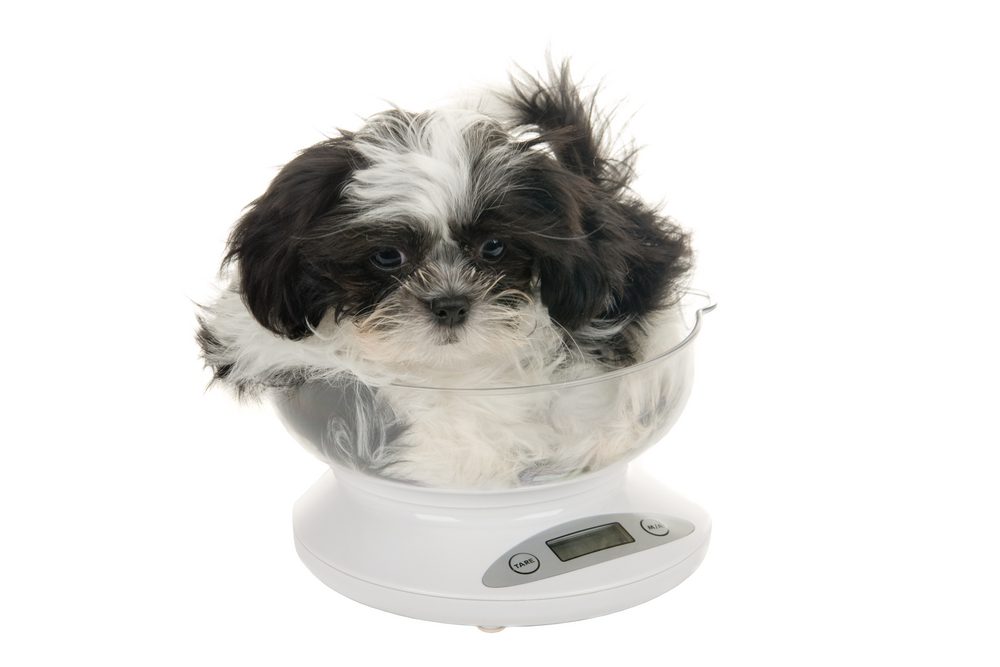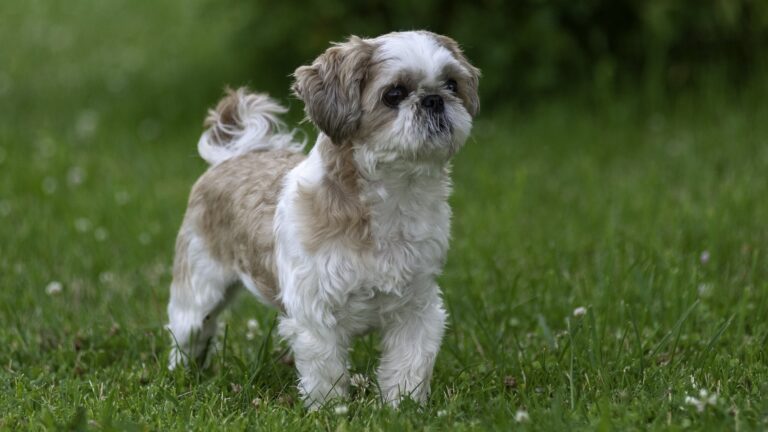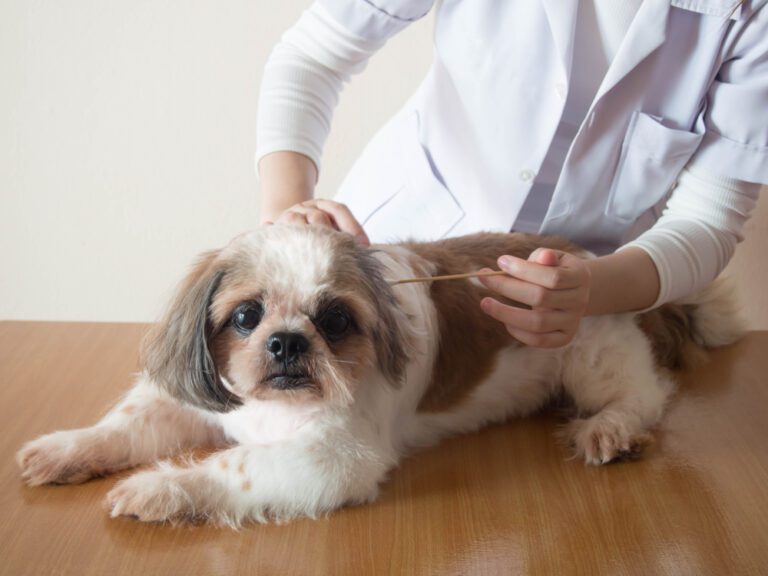How Much Should A Shih Tzu Weigh: Complete Guide
Are you the proud owner of a Shih Tzu, or are you considering getting one? You’re certainly not alone – these furry little friends make for wonderful pets. But beyond just being great companions to have around the house, did you know that it’s important to keep your pup at a healthy weight?
The ideal weight depends on various factors such as age, sex, genetics, and more. With the right regime and understanding of what’s normal for your pup, you can provide them with optimal health.
In this blog post, we’ll explore an overview of how much should a Shih Tzu weigh and other vital information. So let’s dive into everything you need to know about maintaining your pet’s ideal weight!
Shih Tzu Growth Patterns: Weight Chart from Puppy to Adult Shih Tzu

-
The average weight of a Shih Tzu at birth is between 4 and 8 ounces.
-
A Shih Tzu typically doubles its birth weight by one week old, triples its birth weight by the time it is two weeks old, and quadruples its birth weight by the time it is three weeks old.
-
Shih Tzu puppies weigh between 3 and 7 pounds.
-
They will gain about 1 pound per week during their first four months.
-
From 4 to 8 months, they will gain about ½ pound per week.
-
From 8 to 12 months, they will only gain about ¼ pound per week.
-
They will reach their adult weight at around 16 to 18 months old.
-
Most Shih Tzus weigh between 9 and 16 pounds when they are fully grown.
-
The average lifespan of a Shih Tzu is between 10 and 18 years
-
Some adult Shih Tzus may weigh more or less than the average, depending on their individual growth patterns.
-
Male Shih Tzus typically weigh more than female Shih Tzus.
-
Some Shih Tzus may reach their full adult weight by the time they are 12 months old, while others may not reach their full adult weight until they are 18 months old or even older.
-
It is important to monitor your Shih Tzu’s weight and consult with your veterinarian if you have any concerns about their growth pattern.
What are the Factors that Affect Shih Tzu Weight?

A properly proportioned Shih Tzu should be slightly longer than tall, with a compact, solid, and well-balanced body. Several factors can affect a Shih Tzu’s weight:
1. Genetics
Genetics is one of the primary factors that can affect a Shih Tzu’s weight. Some dogs are born with a predisposition to being overweight, while others may be predisposed to being underweight. Not much can be done to change a dog’s genetic makeup, so it is important to be aware of this factor when considering a Shih Tzu’s weight.
2. Diet
Another important factor that can affect a Shih Tzu’s weight is diet. If a dog is fed too much food, or food that is high in calories, it will likely gain weight. On the other hand, if a dog is not fed enough food or food that is low in calories, it may lose weight. It is important to feed a Shih Tzu a balanced diet that meets their nutritional needs to maintain a healthy weight.
3. Exercise
Exercise is another key factor in maintaining a healthy weight for a Shih Tzu. Dogs that do not get enough exercise are more likely to be overweight, while those that get plenty of exercises are less likely to be overweight. It is important to find an exercise routine that works for the dog and the owner and stick with it regularly.
4. Age
Age can also play a role in a Shih Tzu’s weight. Puppies and young dogs tend to be leaner than older dogs, as they have more energy and burn more calories. As dogs age, they become less active and may gain weight if their diet and exercise habits do not change accordingly. It is important to monitor a Shih Tzu’s weight as they age and changes their diet and exercise routine as needed.
5. Gender
Gender can also be a factor in a Shih Tzu’s weight. Males tend to be larger and heavier than females, on average. However, no individual dog is guaranteed to conform to this general trend. It is important to consider gender and individual size when determining an appropriate weight for a Shih Tzu.
How To Properly Weigh and Measure a Shih Tzu?

-
Use a digital scale that is accurate to within 1/8th of a pound. Place the scale on a level surface and make sure the weight is zeroed out before placing your dog on the scale.
-
Weigh your dog in pounds and ounces or kilograms and grams. Do not convert between the two units of measure, as this will result in an inaccurate weight.
-
Record your Shih Tzu’s weight in a notebook or on a piece of paper so you can track its progress over time.
-
Use a tape measure to measure your dog’s height from the ground to the top of its shoulders (the withers).
-
Record your dog’s height in inches or centimetres. Do not convert between the two units of measure, as this will result in an inaccurate measurement.
-
Use a tape measure to measure your Shih Tuz’s length from the base of its neck to the base of its tail.
-
Record your dog’s length in inches or centimetres. Do not convert between the two units of measure, as this will result in an inaccurate measurement.
-
Use a tape measure to the circumference of your dog’s chest at its widest point. This is typically just behind the front legs.
-
Record your dog’s chest circumference in inches or centimetres. Do not convert between the two units of measure, as this will result in an inaccurate measurement.
-
Use a tape measure to the circumference of your dog’s waist at its smallest point (typically just behind the ribs).
Recommended Digital Scales
How to Make Sure that Shih Tzu is healthy?
A Shih Tzu’s lifespan is comparatively longer than other dog breeds because of its small size. With their long life expectancy, it’s important to keep your Shih Tzu healthy so that they can enjoy a good quality of life well into their senior years. Here are a few tips on how to make sure your Shih Tzu stays healthy:
1. Feed them a high-quality diet
Shih Tzus are prone to weight gain, so it’s important to feed them a diet high in protein and low in calories. There are specially formulated diets available for Shih Tzus that will help them maintain a healthy weight.
2. Get them regular exercise
Like all dogs, Shih Tzus need regular exercise to stay healthy. A daily walk or play session will help keep their muscles and joints strong and can also help prevent obesity.
3. Keep up with their grooming
Shih Tzus have long coats that require regular brushing and bathing. Neglecting their coat can lead to mats and tangles, which can be painful for the dog and difficult to brush out. Regular grooming will also help to remove any dirt and debris that could cause skin problems.
Related: Shih Tzu Coat Care: How To Make It Shiny And Healthy?
4. Take them for routine checkups

Taking your Shih Tzu to the vet for routine checkups and vaccinations is important. It will help catch any potential health problems early on and get your dog the necessary treatment.
Conclusion
It is important to know how much should a Shih Tzu weigh and its growth pattern to make sure they are healthy. If you have any concerns about Shih Tzu’s weight, please consult your veterinarian. Weighing and measuring your dog properly can help identify any problems early on. If you have any other questions about Shih Tzu’s weight, please don’t hesitate to ask us in the comments section!
FAQs
How Much Should A Shih Tzu Puppy Gain Per Month?
Shih Tzu puppies typically gain around 1 to 2 pounds per month in their first year of life. It is recommended for puppies to gain about 5 to 10 percent of their current body weight each month.
When Is a Shih Tzu Fully Grown?
Shih Tzus reach full size at about one year of age. They can continue to fill out for another year or two but should have their adult dimensions by 12 months old. Their weight usually remains stable after this point, but they’ll still continue to mature mentally and emotionally.
What Causes Obesity in Shih Tzus?
Shih Tzus are prone to obesity due to their small size and lack of exercise. An unhealthy diet consisting of high-fat, sugary foods can also contribute to weight gain. Exercise, portion control, and regular vet visits are all important in keeping your Shih Tzu healthy and fit.
When Do Shih Tzus Stop Growing?
Shih Tzu puppies generally start to mature between the ages of 7 and 12 months, with full physical growth usually being completed by 18 months. After this time, they may continue to fill out and develop physically until they are 2-3 years old.
Will A Shih Tzu Grow After Being Neutered/Spayed?
Neutering or spaying a Shih Tzu will not stop its growth, but it can affect its maturity rate. The rate at which a Shih Tzu reaches its full size is typically slower after being altered as it will be less active and have fewer hormone-driven muscle gains.
What If My Shih Tzu Is Not The Right Weight?
If your Shih Tzu is not the right weight, consult a vet for advice on diet and exercise. Reevaluate their daily routine and make adjustments where needed to ensure they’re getting enough physical activity. Monitor meals and snacks, ensuring your pup gets the right nutrients in the right amounts. With dedication, you can help them reach their ideal weight.










